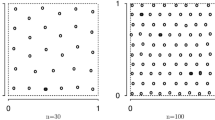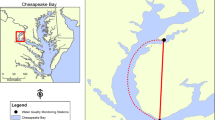Abstract
Environmental monitoring is the process of sampling and analyzing specific environmental data. In the practical preparation of the data collecting process, we should consider the optimization of two contradictory criteria: On the one hand, we want to gain as much information as possible which would result in big samples. On the other hand, sampling is costly and we often have to minimize these costs which would result in small samples. An optimal experimental design bridges these opposing objectives which results in: get as much information from as small samples as possible! Based on the sampled data the values of interest are estimated for the whole field, in statistical terminology, this is called prediction. The uncertainty of prediction strongly depends on the location and time of the sampled data, in statistical terms the design. In practical data collecting processes, the most frequently used designs still are more or less space-filling, e.g., measurements on a regular grid. These designs are far from being optimal with respect to the quality of prediction. Assuming certain theoretical models for the data generating process yields designs and corresponding predictions that are several times more reliable than those from space-filling designs. The chosen covariance structure crucially influences the validity of the assumed model. We compare different spatiotemporal covariance models by applying them to water quality data from the Management Unit of the North Sea Mathematical Models and the Scheldt estuary (MUMM). The results favor more complex covariance structures and clearly outperform space-filling designs.
Access this chapter
Tax calculation will be finalised at checkout
Purchases are for personal use only
Similar content being viewed by others
References
Cressie, N., Wikle C.: Statistics for Spatio-Temporal Data. Wiley (2011)
Mitchell, M., Genton, M., Gumpertz, M.: Testing for Separability of Covariances. Econometrics 16, 819–31 (2005)
Montero, J.M., Fernández-Avilés, G., Mateau, J., Spatial and Spatio-Temporal Geostatistical Modeling and Kriging, Wiley (2015)
Müller, W.G., Pronzato, L., Rendas, J., Waldl, H.: Efficient Prediction Designs for Random Fields. Appl. Stochastic Models Bus. Ind. 31, 178–194 (2015)
Author information
Authors and Affiliations
Corresponding author
Editor information
Editors and Affiliations
Rights and permissions
Copyright information
© 2021 The Editor(s) (if applicable) and The Author(s), under exclusive license to Springer Nature Switzerland AG
About this paper
Cite this paper
Waldl, H. (2021). Quality of Prediction for Spatiotemporal Covariance Models. In: Ksibi, M., et al. Recent Advances in Environmental Science from the Euro-Mediterranean and Surrounding Regions (2nd Edition). EMCEI 2019. Environmental Science and Engineering(). Springer, Cham. https://doi.org/10.1007/978-3-030-51210-1_80
Download citation
DOI: https://doi.org/10.1007/978-3-030-51210-1_80
Published:
Publisher Name: Springer, Cham
Print ISBN: 978-3-030-51209-5
Online ISBN: 978-3-030-51210-1
eBook Packages: Earth and Environmental ScienceEarth and Environmental Science (R0)




